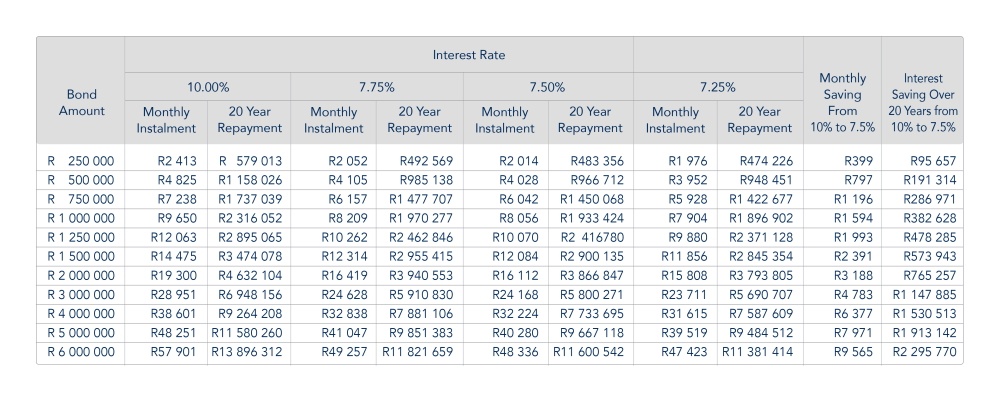
Rate announcement - January 2022
2022 is still a good year for property even if the repo rate increases slightly this week
Four takeaway coffees - this is the equivalent cost of what homeowners paying off a R1 million bond can expect to pay extra each month should the repo rate increase by 25 basis points this week.
While this does mean that consumers will be digging a bit deeper into their pockets, they will still pay considerably less than they were at the beginning of 2020 when the prime lending rate was in double digits. "Should the prime lending rate increase to 7.5% (from 7.25%) on Thursday, the difference in monthly payments on a R1 million bond when the prime lending rate was at 10% will be almost R1 600, and just over R3 000 on a R2 million bond. This shows that there is still time to invest in property while bonds are affordable," explains Carl Coetzee, CEO of BetterBond.
"After more than a year of record-low interest rates, a shift upwards is not unexpected. The good news is that we anticipate a gradual increase, with the South African Reserve Bank forecasting nominal increases for the next three years," says Coetzee. "Bearing in mind that the first few years of a bond repayment generally covers the interest, it makes sense to buy now before interest rates hit 10%; expected towards the end of 2024."
Coetzee adds that by approaching more than one bank, a bond originator is able to negotiate a better rate concession as the banks compete to offer the best deal. BetterBond's average interest rate concession when applying to four banks is prime minus 0.61% which, at a prime lending rate of 7.5% (should the repo rate increase this week), brings the interest rate down to a comfortable 6.89%. This results in a total saving of R177 000 on a R2 million bond with a 20-year repayment period.
The table below illustrates the monthly installments at the current prime lending rate of 7.25%, as well as at 7.5% should the repo rate increase this week. By example, if the prime lending rate increases to 7.5% this week, home owners will pay an extra R152 a month on a R1 million bond." The table also compares these amounts with the monthly installment when the prime lending rate is at 10%.

A lengthy period of low interest rates has done well to stabilise the housing property market. While buyer activity may have started to moderate, it is still well above pre-pandemic levels, says Coetzee. "Deeds office registrations increased by a significant 11.47% for the six months ending in November 2021, up from the 8.43% growth recorded for the same period in 2020. Similarly, BetterBond's home loan registrations for the six months ending in November last year increased by just over 19%."
The latest FNB Property Barometer (January) suggests that the current wave of activity is being driven by buyers who are less sensitive to interest rate hikes. "Whereas the initial surge in activity seen in June 2020 soon after the easing of lockdown restrictions was from first-time buyers making the most of the low interest rates, we are now seeing renewed interest from repeat buyers," says Coetzee. FNB reports that most of the sales activity is from buyers between the ages of 35 and 55, and even those older than 55, who have equity and savings to pay larger deposits.
"Also, buyers" needs have changed and we are seeing more people semigrating to the coast or smaller towns where they can work remotely and enjoy a better quality of life. This trend is expected to bolster buyer activity over the next few months notwithstanding the gradual rise in interest rates."
House price growth appears to have flattened, says Coetzee, with FNB expecting house prices to average between 3% and 4% in 2022. "But what is encouraging is that the time properties are staying on the market - a good indicator of the state of the property sector - has shortened from eight weeks and six days to seven weeks and six days; well below the global average of 14 weeks and one day reported after the global financial crisis of 2019.
"Unfortunately, interest rates have to increase at some point to accommodate inflation risks and economic constraints, but these hikes will be gradual giving buyers an opportunity to make the most of the favourable lending environment while they can," says Coetzee. Furthermore, these adjustments come at a time when the property market is doing well, having shown remarkable resilience during the pandemic. "The outcome of holding the repo rate steady for so long is that we are dealing with a very different housing market from the one that slumped into 2009 when the property boom bubble burst."
Related articles
Homebuyers guide
How much can you afford?
Your dream home is closer than you think. Make your budget work with the help of our range of calculators
